Looking for the best Damascus Santoku knife in the culinary world?
Let’s explore the top contenders in this category, focusing on their precision and performance.
Join us as we compare and analyze the intricate details of these knives, helping you make an informed decision that could elevate your culinary experience.
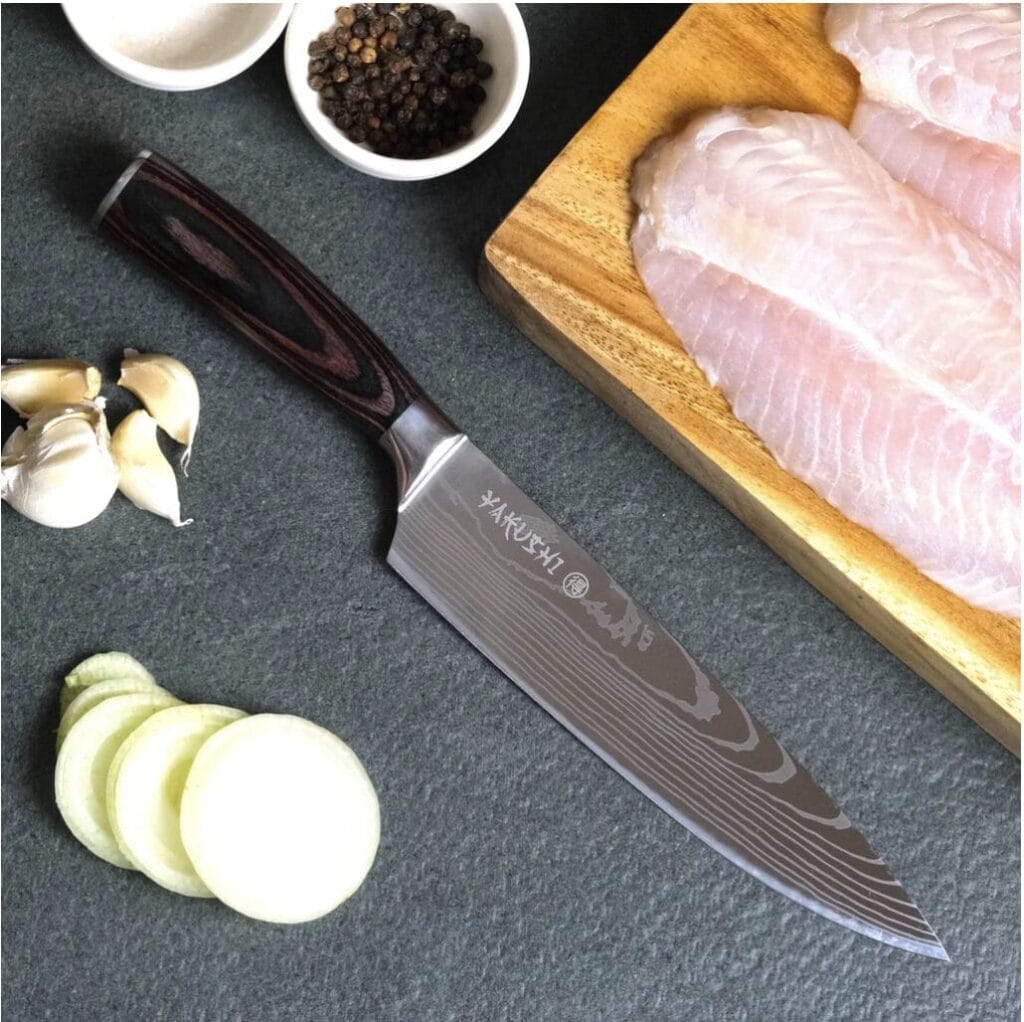
Key Takeaways
- The best Damascus Santoku knife is distinguished by its exceptional craftsmanship and cutting abilities, making it a valuable asset in any kitchen.
- Opting for quality and functionality is key when selecting a Santoku knife. Enhance your culinary skills and effortlessly create culinary delights by choosing the best Damascus Santoku knife.
- Remember, quality always prevails over quantity in the kitchen.
Best Damascus Santoku knife
Looking for the best Damascus Santoku knife? Let’s break it down by exploring top contenders.
The Yakushi™ Classic Chef Knife and Yakushi™ Full Set (8 pieces) stand out for their exceptional quality and performance.
For those seeking premium options, the Sakai Takayuki – 33-Layer Santoku Wa, Masutani Hamono – Western VG1 Migaki Santoku, and Masutani Hamono – Sairyu Western knives are also worth considering in the realm of Damascus Santoku knives.
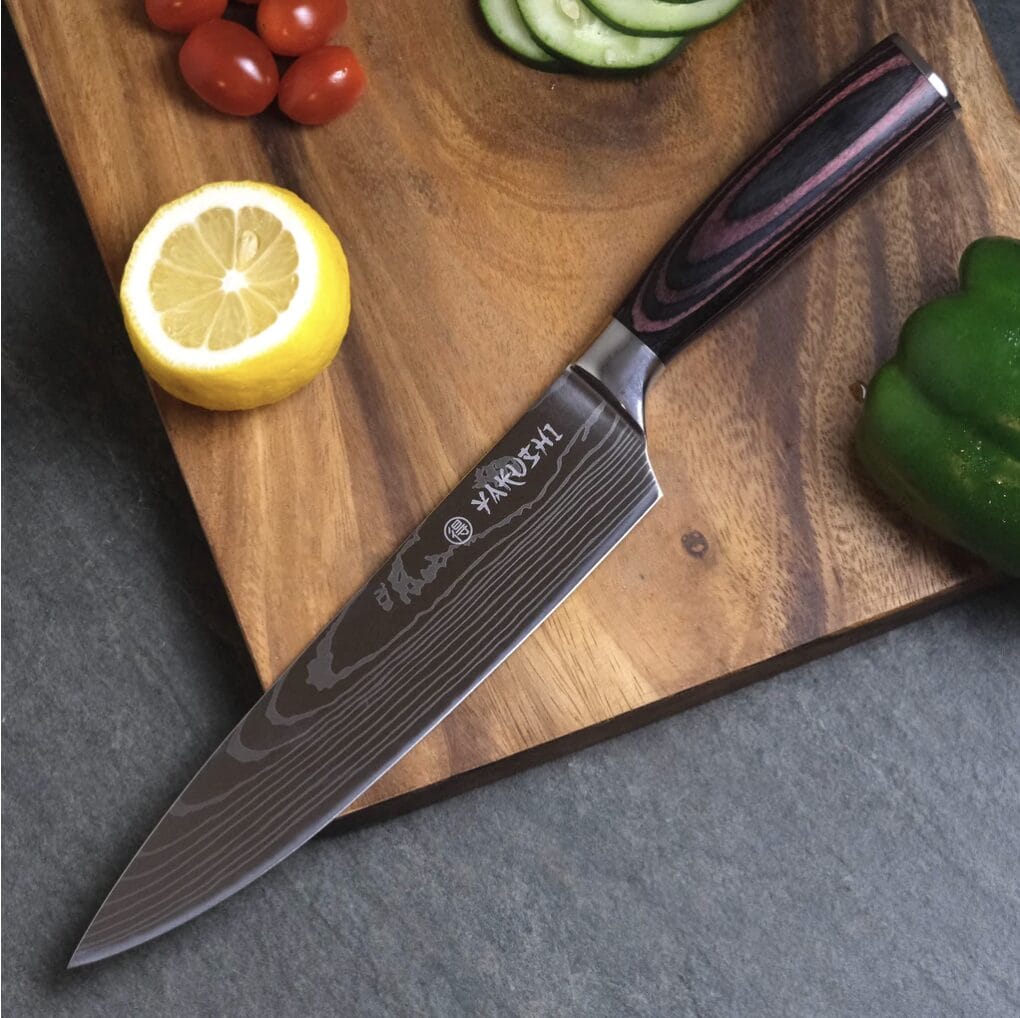
Yakushi™ Classic Chef Knife
The Ultimate Choice for Precision and Durability
When it comes to a Damascus Santoku knife that embodies precision and durability, look no further than the Yakushi™ Classic Chef Knife. Crafted from top-notch stainless steel with full tang construction, this knife boasts a razor-sharp blade for precise cutting and an ergonomic handle for a comfortable grip.
Its versatility in various kitchen tasks, effortless slicing through ingredients, and capability to reduce prep time make it a valuable tool. The Yakushi™ Classic Chef Knife offers control and precision in cutting, minimizes hand fatigue during prolonged use, and enhances the overall cooking experience.
With a 5-star rating from 90% of customers, praise for its exceptional sharpness and durability, and positive feedback on its comfortable grip and versatility, this knife comes highly recommended by professional chefs and cooking enthusiasts.
Best For: Those looking for a versatile and durable knife for precise cutting and enhanced control in various kitchen tasks.
Pros:
- Crafted from top-quality stainless steel with full tang construction
- Razor-sharp blade for precise cutting
- Ergonomic handle for a comfortable grip
Cons:
- May need regular sharpening to maintain sharpness
Yakushi™ Full Set (8 pieces)
The Yakushi™ Full Set is ideal for professional chefs and home cooks seeking a complete collection of high-quality knives for precise and versatile cooking tasks. This set includes:
- Chef Knife
- Santoku Knife
- Paring Knife
- Bread Knife
- Cleaver Knife
- Santoku Knife
- Slicing Knife
- Boning Knife
Each knife features a premium Pakka Wood handle and a high carbon stainless steel blade, ensuring durability and comfort. The full composite tang and double-beveled edge blade provide perfect balance and precision.
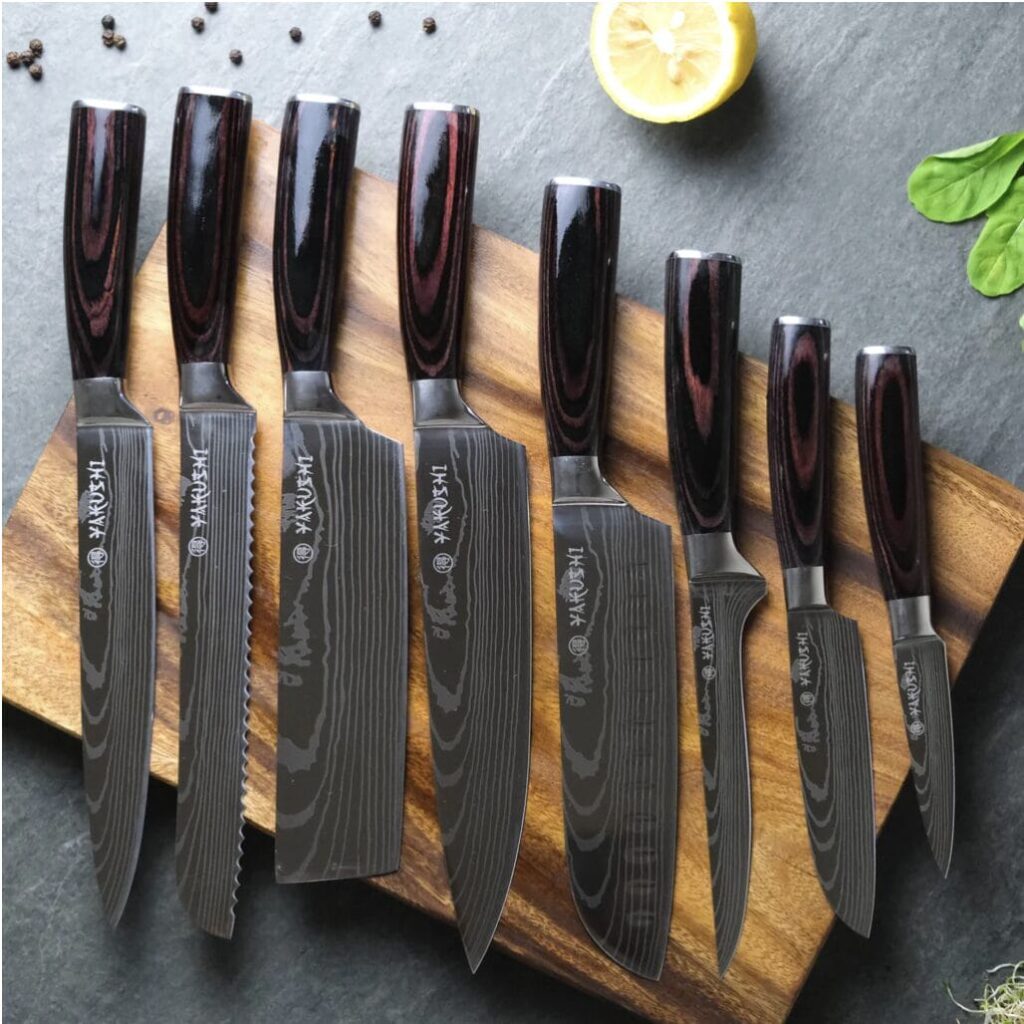
These knives are designed to minimize strain on hands and wrists, making kitchen tasks effortless. While these knives aren’t suitable for dishwasher use and require handwashing for maintenance, they offer exceptional performance.
Best For: Home cooks and professional chefs looking for a versatile and high-quality knife set that offers unparalleled comfort and performance.
Pros:
- Premium Pakka Wood handle and high carbon stainless steel blade ensure a comfortable and precise cutting experience
- Full composite tang provides perfect balance and control, making meal prep a breeze
- Variety of different sizes and shapes cater to specific cooking needs, ensuring convenience and efficiency in the kitchen
Cons:
- Not recommended for dishwasher use, as harsh detergents, high-heat, and abrasive cleaning methods can damage the knives
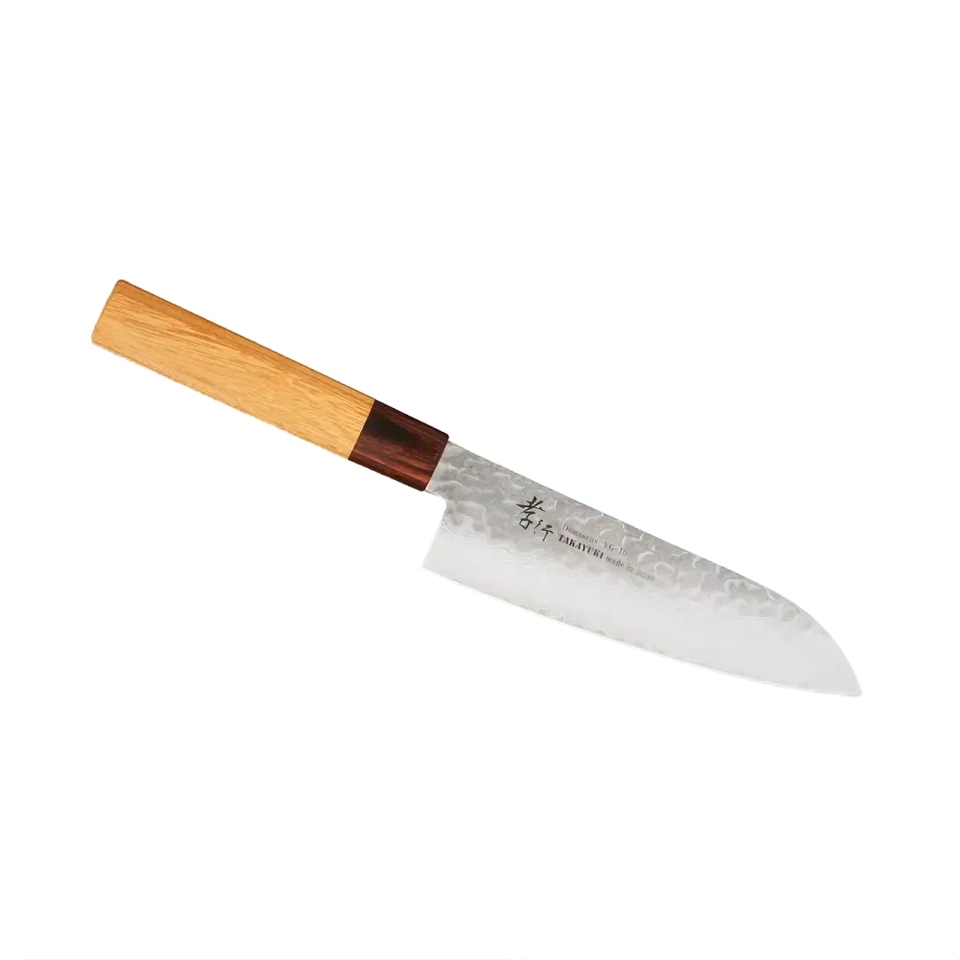
Sakai Takayuki – 33-Layer Santoku Wa
Sakai Takayuki – 33-Layer Santoku Wa is an excellent choice for those who want a high-quality Japanese knife for precise cutting tasks.
It’s made of a 33-layer Damascus stainless steel blade with a VG-10 stainless steel core, ensuring durability and sharpness.
The knife features an octagon-shaped handle crafted from red zelcova wood and mahogany-colored wood, providing a comfortable and secure grip.
With a 17 cm blade length and a double bevel edge design, it’s suitable for various cutting tasks.
To keep it in top condition, it’s recommended to hand wash with warm water, dry with a towel, and avoid cutting hard or frozen items.
This knife delivers a superior cutting experience for those who value performance and craftsmanship.
Best For: Serious Cooks Seeking a Multi-Task Master. This targets those who prioritize functionality and highlights the knife’s versatility.
Pros:
- Elegant and Traditionally Crafted Handle: The octagonal red zelcova wood with mahogany accents offers a beautiful, classic look and potentially a comfortable grip due to the octagonal shape
- High-Performance Blade: The 33-layer Damascus stainless steel with a VG-10 core combines the beauty of Damascus patterning with the exceptional sharpness, durability, and stain resistance of VG-10 steel
Cons:
- Maintenance Needs: High-quality knives like this one may require more specific care, such as handwashing and honing, compared to lower-maintenance knives
Masutani Hamono – Western VG1 Migaki Santoku
A Versatile and Balanced Culinary Tool
Blending Eastern and Western design, the Masutani Hamono Western VG1 Migaki Santoku knife offers culinary enthusiasts exceptional sharpness and balance.
Crafted from VG1 Migaki steel, this knife features a 1.9mm thick double-edged blade for remarkable durability and sharpness. The comfortable mahogany handle with a stainless steel ferrule ensures a secure grip and easy cleaning.
With a length of 170mm and a blade height of 45mm, this Santoku knife is ideal for a variety of kitchen tasks. Consider the Masutani Hamono – Western VG1 Migaki Santoku for a reliable addition to your culinary arsenal.
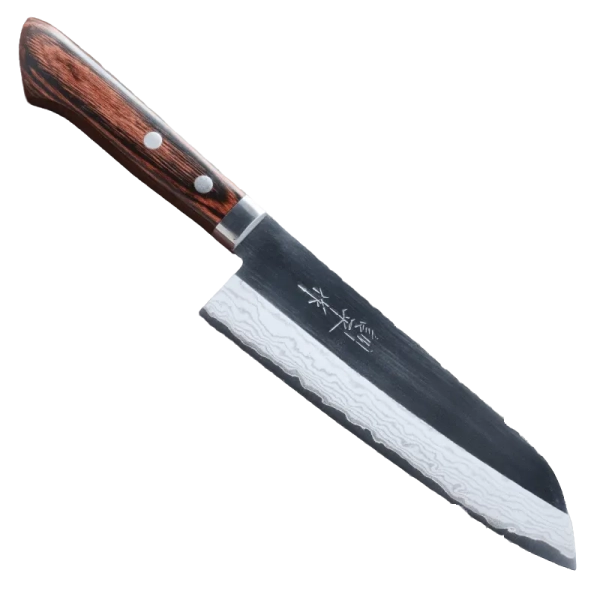
Best For: Culinary enthusiasts seeking a versatile and balanced kitchen tool with exceptional sharpness.
Pros:
- Versatile design suitable for various kitchen tasks
- Double-edged blade for remarkable sharpness
- Comfortable mahogany handle for a secure grip
Cons:
- May require regular honing and sharpening for optimal performance
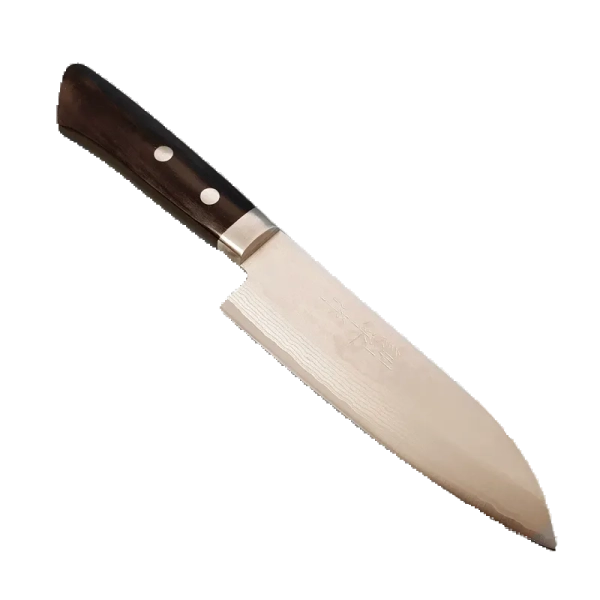
Masutani Hamono – Sairyu Western
Is the Masutani Hamono – Sairyu Western Small Santoku a reliable kitchen companion?
When considering a versatile and dependable kitchen tool, the Masutani Hamono – Sairyu Western Small Santokuemerges as a top choice among the finest Damascus Santoku knives.
Although there are currently no reviews, you have the unique opportunity to be the inaugural reviewer and share your firsthand experience with this exceptional blade. By providing feedback with ratings ranging from Perfect to Very poor, you can assist others in making well-informed decisions.
Crafted with precision by the passionate artisans of Masutani Hamono, this Belgian brand guarantees quality and performance in every blade. Backed by a 14-day money-back guarantee, customer satisfaction is their utmost priority.
Embark on a culinary journey with the Masutani Hamono – Sairyu Western to discover the artistry of Damascus Santoku knives and elevate your cooking experience.
Best For: Enthusiastic home cooks and culinary professionals seeking a versatile and precise knife for a multitude of kitchen tasks.
Pros:
- Versatile blade suitable for slicing, dicing, and chopping a variety of ingredients
- Exceptional precision and maneuverability for precise cutting outcomes
- Granton edge design prevents food from clinging to the blade, ensuring cleaner cuts
Cons:
- Requires regular honing and occasional sharpening to maintain sharpness
Things to consider when buying a Damascus Santoku knife
When considering purchasing a Santoku knife, it’s essential to evaluate the blade material, handle design, blade length, balance, and price range.
These factors are crucial in determining the knife’s performance, comfort, and value for money.
Blade Material Consideration
When choosing a Santoku knife, it’s essential to consider the blade material. Here are some key points to consider:
- Damascus Santoku Knife: Consider a Damascus steel Santoku knife for its unique patterns and strength.
- Sharp Edge: Look for a blade material that maintains a sharp edge for longer periods.
- Steel Type: Opt for high-quality steel like VG-10 or AUS-10 for durability and edge retention.
- Handle: Ensure the blade material complements the handle for a comfortable grip.
- Maintenance: Consider the maintenance needs of the blade material for effortless upkeep of your Santoku knife.
Handle Design Preference for Santoku Knives
When choosing a Santoku knife, it’s essential to consider the handle design preference. The handle significantly impacts the knife’s comfort and usability. Opting for a handle like Pakka wood can enhance aesthetics and provide a comfortable grip. Quality Japanese knives often have ergonomic handles for ease of use and precision.
Here are some key aspects to consider for Santoku Damascus knife handles:
| Aesthetic appeal | Blade Color |
| Comfortable grip | Pakka Wood Handle |
| Personal preference | Durability |
| Coordination with kitchen decor | Enhanced control |
| Blade accentuation | Resistance to moisture |
| Stylish look | Smooth finish |
Considering these factors will help you choose a Santoku knife with a handle design that suits your needs, making it an ideal kitchen gift.
Blade Length Comfort
When choosing a Santoku knife for optimal comfort and functionality, it’s essential to consider the blade length carefully. Here are some important points to bear in mind:
- Personal Preference: Select a blade length that feels comfortable and matches your cutting style.
- Japanese Tradition: Take into account the preference of Japanese cooks, who often lean towards shorter blade lengths.
- Control and Precision: Opt for a length that allows for precise cuts and easy handling.
- Versatility: A medium-length blade strikes a good balance for both slicing and chopping tasks.
- Damascus Steel Appeal: Explore how the blade length can enhance both the beauty and functionality of a Damascus steel Santoku knife.
Balance of Blade
The balance of the blade is crucial when choosing a Santoku knife. It ensures you can handle cutting tasks with precision and ease.
A well-balanced blade is like an extension of your hand, allowing smooth maneuvering through ingredients.
Opt for a light-weight design for improved maneuverability and control, enhancing your cooking experience and turning your kitchen tool into a work of art.
Price Range Comparison
When comparing Santoku knives, it’s crucial to consider the price range. Here are some key points to keep in mind:
- Budget-Friendly Options: These knives are affordable yet still offer quality performance.
- Mid-Range Selections: Balancing price and quality for everyday cutting tasks.
- High-End Choices: Premium knives with exceptional craftsmanship and high-quality materials.
- Value for Money: Finding a knife that provides great features at a reasonable price.
- Luxury Picks: Exquisite knives with top-notch materials and design elements.
Conclusion
The best Damascus Santoku knife stands out due to its exceptional craftsmanship and cutting capabilities, making it a valuable addition to any kitchen.
Prioritizing quality and functionality when choosing a Santoku knife is crucial. Opt for the best Damascus Santoku knifeto enhance your culinary skills and effortlessly create culinary masterpieces.
Remember, quality always triumphs over quantity in the kitchen.
